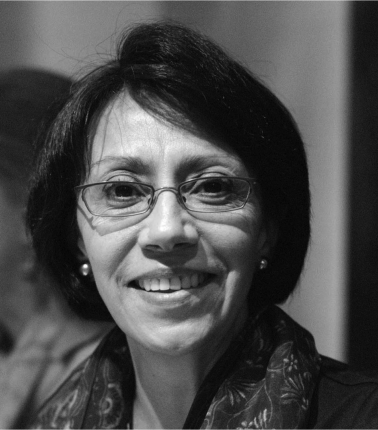
Departmental Affiliations
Primary
Center & Institute Affiliations
Maria-Elena Figueroa, PhD '96, researches health behavior and applied communication worldwide, and directs CCP’s Global Program on Water and Hygiene.
Research Interests
Communication theory and research; program monitoring and evaluation; health care seeking; safe water, sanitation and hygiene -WASH; social and behavior change; community dialogue and collective action; development communication; participatory methods in formative research; mixed-methods research; econometric methods.
Experiences & Accomplishments
Education
PhD
Johns Hopkins Bloomberg School of Public Health
1996
BS
National Autonomous University of Mexico
1978
Overview
Dr. Figueroa (she/her) is a social scientist and leading expert on health behavior change. Her practice-oriented research encompasses a wide range of health and social issues, and spans over more than 30 years working in Latin America, Asia and Africa. Her interest in interdisciplinary research and the use of different theoretical approaches and methodologies have allowed her to develop theoretical frameworks and research tools that have been widely used to provide a more comprehensive understanding of cultural, household and individual factors that account for health behavior differentials, and to develop more effective interventions. Her current research interests include developing appropriate research protocols to better understand the structural, social and cultural factors that explain safe water, sanitation and hygiene behaviors worldwide. She has tested and used innovative methodologies to explore gender and sexual norms underlying HIV prevalence in Mozambique. She has pioneered the use of outcome monitoring at the Center for Communication Programs and led the development of a web-based platform to enhance the design of program monitoring approaches, monitoring data collection and use for social and behavior change programs worldwide. Dr. Figueroa is a founding member of the Johns Hopkins University Global Water Program and a member of its Steering Committee.
Select Publications
Publications were selected based on their unique contributions to their respective field. The theoretical model on correlates of water treatment introduced the role of behavior to the WASH sector; it has influenced the research and design of WASH interventions. The Ebola paper demonstrates the application of the Pathways socioecological model to the Ebola risk communication response. Using multiple data sources, the HIV stigma paper shows stigma is not a monolithic term and recommends identifying its components to design more effective interventions. The communication for social change monograph introduces a theory-based process of community dialogue and collective action that leads to sustained social development; it has been widely used by development practitioners worldwide. The Mozambique gender and sexuality paper provides a discussion on the use of projective techniques as a methodology for formative research on sensitive issues minimizing participation from external researchers to allow for the voice of participants to emerge unfiltered.
- Figueroa ME & Kincaid DL. (2010). The Influence of Social, Cultural and Behavioural Factors on Uptake of Household Water Treatment and Safe Storage. Center Publication No. (1). Baltimore: Johns Hopkins Bloomberg School of Public Health , Center for Communication Programs.
- Figueroa, M.E. (2017). A theory-based socioecological model of communication and behavior for the containment of the Ebola epidemic in Liberia. Journal of Health Communication. Special issue on Ebola.
- Carrasco, M., Arias, R., and Figueroa, M.E. (2017). The multidimensional nature of HIV stigma: Evidence from Mozambique. African Journal of AIDS Research, 16:1, 11-18.
- Figueroa ME., Kincaid D.L., Rani, M. and Lewis, G. (2002). Communication for Social Change: A Model for Measuring the Processes and its Outcomes. Working Paper Series. Published by the Rockefeller Foundation August, 2002
- Holman, E., Harbour, C., Said, R. & Figueroa, M.E. (2016). In the eyes of the beholder: Using photo-based projective techniques to elicit normative and alternative discourses on gender, relationships and sexuality in Mozambique. Global Public Health, Special issue on Participatory visual methodologies in global public health.
Projects
ROSHNI (Rights for Sanitation, Health, and Nutrition Initiative): a large scale nutrition-WASH programme in India
Evaluation of Adolescent Education Program in Schools in India
Health, Nutrition and Governance program in Guatemala
Evaluating the Impact of Mass Media Efforts on Multiple Concurrent Partnerships in Mozambique
Child, early and forced marriage (CEFM) program, Malawi
